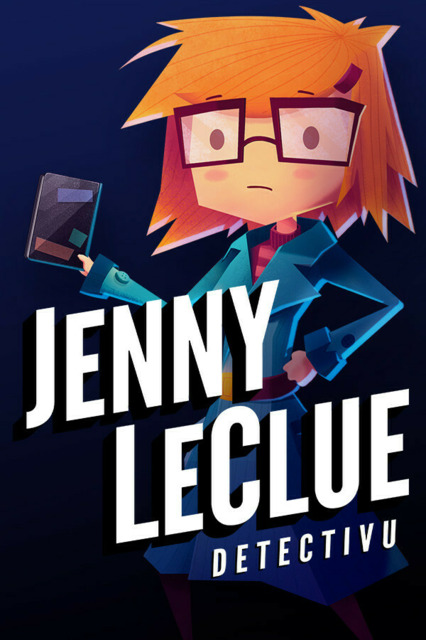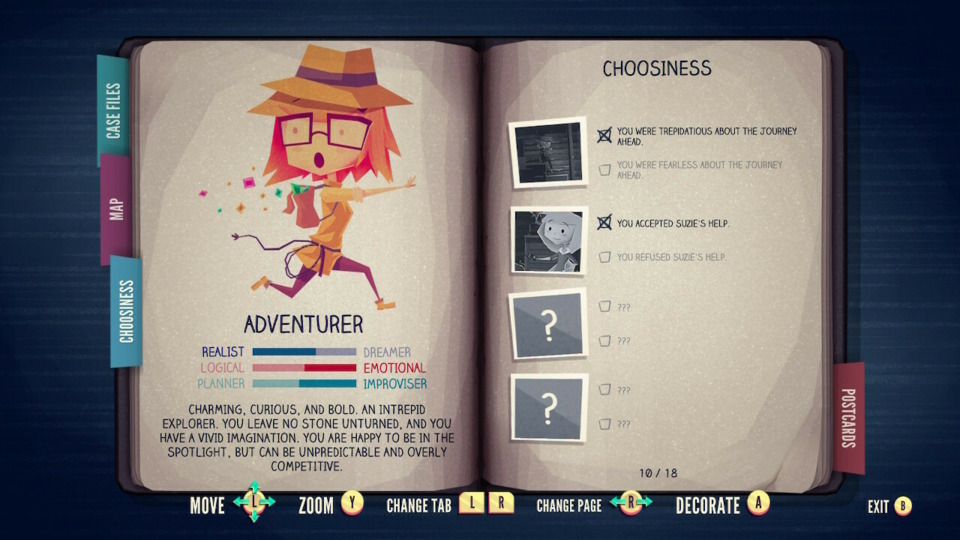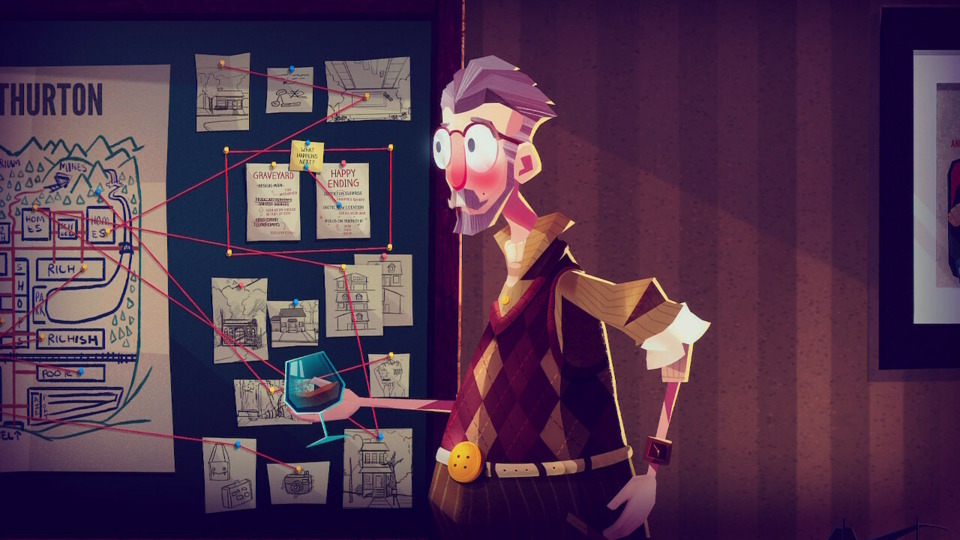Indie Game of the Week 212: Jenny LeClue: Detectivú
By Mento 1 Comments

Any good detective fiction should keep the audience guessing, placing the protagonist's power of deduction slightly ahead of everyone else's and allowing them to freely dispense the shocks and twists in the denouement of the adventure. However, with video games and the player's heightened role in same it's hard to pull that off: after all, if we're controlling the detective hero in question, shouldn't we know everything they know? If we're going through the clue-gathering deductive process step by step, it robs us of that revealing final act and many other surprises. If I had to credit Mografi's Jenny LeClue Detectivú with a specific quality rare to this particular thematic genre in this medium, it's that it was wholly unpredictable.
Most video games I've played within the detective fiction genre are usually structured like classic point-and-click adventure games: those that afford you a certain degree of freedom in interrogating suspects and sweeping crime scenes for clues until you're ready to draw some conclusions. Recently those have included Kathy Rain (IGotW #71) and Whispers of a Machine (IGotW #167), and vicarious playthroughs of the many Nancy Drews Abby streamed while she was still at Giant Bomb. I figured girl detective Jenny LeClue (even her name's similar) would follow the same footprints, as early on you find a map of the town and start building a rogue's gallery of locals before the game's first momentous murder happens. Instead, it turned out to be something closer to Oxenfree or the finale of Night in the Woods: an almost entirely linear structure as you scurry around the hidden depths of the town as it slowly reveals its secrets to you, only pausing occasionally for the mostly inconsequential binary decisions, the very inconsequential collectibles, or a mini-game puzzle or two.
The game establishes a framing meta-narrative early with an author by the name of Arthur K. Finkelstein, the creator of the genial Jenny LeClue adventure serial novels. Arthur's a gentle and old-fashioned individual who chafes under his publisher's command to enliven the next Jenny LeClue, as the series has been losing customers due to its low-stakes, low-thrills detective yarns where Jenny might track down a lost library book or a missing cat. Specifically, it needs to have a central murder mystery concerning one of its major characters, which Arthur is loath to do after several dozen episodes of developing the population of his beloved Arthurton. However, while the game revisits Arthur's plight between "chapters" you don't really get a sense of it leading anywhere; there's a few teases that the player, as Arthur, can make big adjustments to the story as it progresses but doesn't capitalize on this idea except towards the end. Likewise, the many choices Jenny herself makes during a story, many of which involve her relationships with ancillary characters like the overachieving rich girl Suzie Glatz, her concerned mother Julie LeClue, or her estranged best friend Keith Strausberry, also don't seem to affect the plot much: the game doesn't even do Telltale's customary data collection informing you where everyone else leaned on these decisions. I've never really been a fan of this binary approach to a branching narrative - they've never felt too significant in Telltale Games, even when lives were on the line, and it activates my FOMO something terrible as I abandon so many roads not travelled - but if you're going to include one you might as well do something with it, subversive or otherwise.

However, the rest of Jenny LeClue is fairly solid. There's a mix of environmental puzzles (pushing rocks around as a step to climb up places, for instance), puzzles based on deductive reasoning (even with the railroad plot, Jenny is required to solve a lot of mysteries to progress), and puzzles with structures I don't often see in games, including a recurring one involving a word cipher, that were entertaining to solve and kept on coming at a rapid pace. The more action-oriented sequences were still platforming by way of adventure game mechnaics, getting to the right zone and having a button prompt to jump up or climb or swing across (which is where the Oxenfree comparison comes in, since most of that game's exploration used a similar format), so it's nothing too intensive if you're more of the adventure game persuasion and just wanted a story and the occasional puzzle to mix things up. If you're a fan of precocious kid detectives, from your Nancy Drews to your Harriets the Spy or what have you, I think this game works both a straight homage to preteen sleuths and as a mild deconstruction of same, as you enter this pre-established world of benign, often silly grown-ups only to start layering in Stranger Things and The X-Files-level mysteries over the top (or under the surface, as the case may be) of this otherwise normal town. The binary choices do at least serve a purpose here to let your particular Jenny LeClue be as much of a caustic, know-it-all brat as you'd like, treating poor Suzie and the other townsfolk you encounter with unwarranted disdain if that amuses you more than playing peacekeeper at every step.
Now that I'm several hours removed from the playthrough, I can't help but think back on how meandering the story was, even if it did keep me guessing throughout. The "interrogations," which involve looking over a zoomed-in character and picking up on odd little discrepancies and asking them about them, made for a novel way to marry deductive reasoning and the usual suspect dialogue tree delivery system for exposition (the mechanics of it reminded me a little of those sequences from the Apollo Justice games where he picks up on a character's tics, though used to serve more of a Sherlock Holmes "I noticed the discoloration on your shoe" type of observation) but these mostly dried up in the second half of the game where it's almost all running around tunnels, forests, graveyards, and secret laboratories on your own building a pile of evidence that never gets used. Other than the slightly manic conspiracy theorist CJ (whose voice actor is doing a bang on Christopher Lloyd impression) who keeps popping up everywhere, you don't spend any significant amount of time with any of the other characters and it's hard to make the player care about the strange occurrences happening to this town and its citizens if you hardly ever encounter the latter. I would've liked to spend more time in the town and around its people before the craziness ensued, putting players in a similar position as the in-universe long-time readers of the Jenny LeClue novels as they're suddenly alienated by this violent and creepy new direction the tale has taken. I won't get into how the specifics of how it ends or its big reveals, except to say that the game ends abruptly without any definitive ending for the sake of a cliffhanger; while you do at least learn the hows behind the central murder mystery, you never get around to the whys (which will, of course, have to wait for a sequel to dig into). All in all, there's a lot about Jenny LeClue: Detectivú that leaves you wanting more information (like what the hell a "detectivú" might be, for one).

I can fault the game's narrative structure until the cows come home, but I can't really fault the sharp adventure game design enterprise Mografi has crafted here. It's evident a great deal of work went into constructing the many different modes of this adventure - I didn't even mention the part where Jenny drives a boat around an enormous lake chasing treasure hunt clues - and I think there's a solid basis here for (hopefully more revealing) sequels to build on, but something about establishing that this is a "Part 1 of who knows how many" serial narrative without warning just rubs me the wrong way. It's why I eventually bounced from the TV show Lost after all, and this game showing up with some familiar mysterious hatches leading to underground labs of an unknown purpose got my hackles up in a similar fashion. Even with all this narrative kvetching, though, I certainly don't think it's a bad game: the puzzles are fun to solve, varied, and thoughtful; the writing has an amusing energy to it as the story (and Jenny) insists on sticking to the dangerous and scary path even as its cautious author balks at every turn; graphically the game has a certain Cartoon Network charm (including that sort of vaguely '70s angled architectural look that many '90s cartoons seemed to love) and a strong use of color, even if I was slightly bothered by the fact that everyone seemed to have a nose except Jenny; and I liked that one variety of collectibles were stickers which could then adorn your journal used for in-game notes and reference materials. It's enough for me to say it's worth a gander at least.
Rating: 4 out of 5.
| < Back to 211: Unravel | The First 100 | The Second 100 | > Forward to 213: Golf Peaks |
